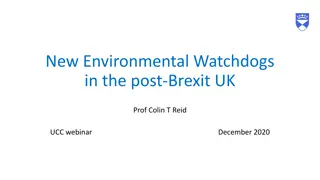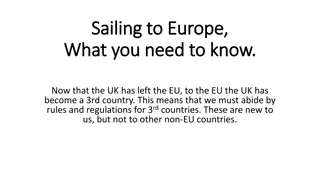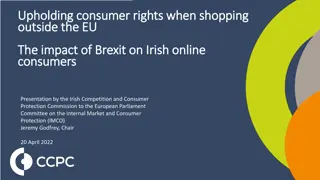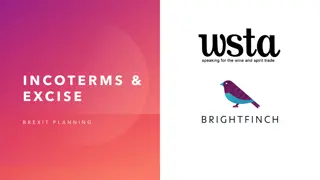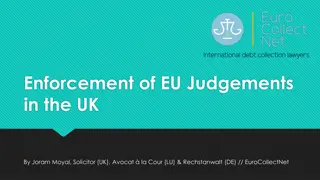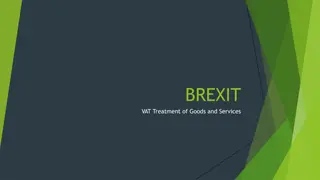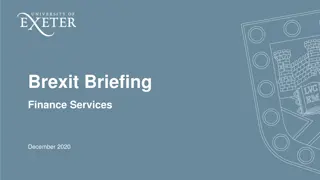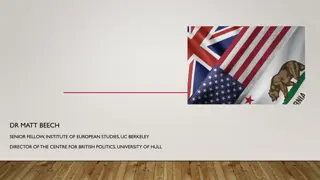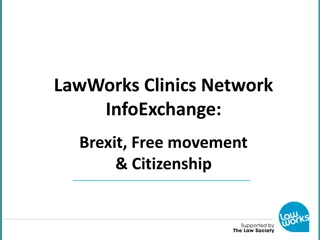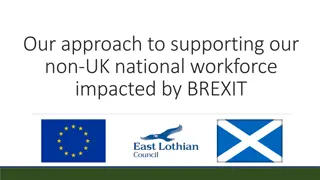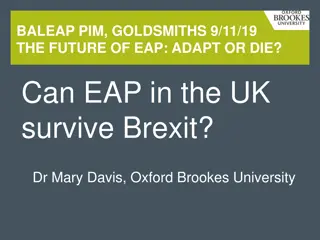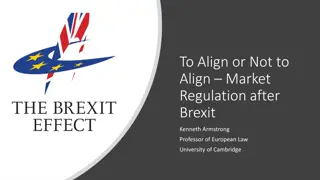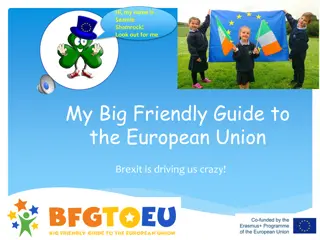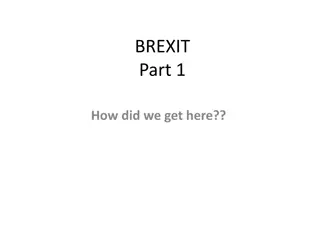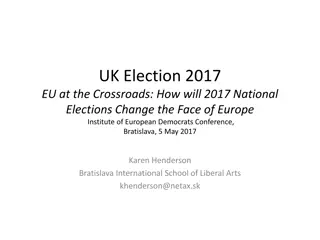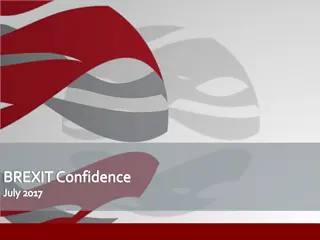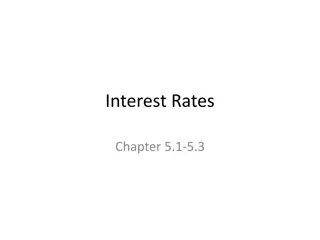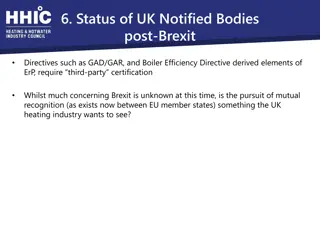
Brexit and the European Union's Impact
Dive into the intricacies of Brexit and the European Union through this insightful overview covering the history, membership, negotiations, and effects of the UK's departure from the EU. Learn about the formation of the EU, its key members, the issues at stake, and the implications of Brexit on various sectors. Explore the complexities of this significant event that continues to shape global economics and politics.
Download Presentation

Please find below an Image/Link to download the presentation.
The content on the website is provided AS IS for your information and personal use only. It may not be sold, licensed, or shared on other websites without obtaining consent from the author. If you encounter any issues during the download, it is possible that the publisher has removed the file from their server.
You are allowed to download the files provided on this website for personal or commercial use, subject to the condition that they are used lawfully. All files are the property of their respective owners.
The content on the website is provided AS IS for your information and personal use only. It may not be sold, licensed, or shared on other websites without obtaining consent from the author.
E N D
Presentation Transcript
Brexit Alan V. Deardorff University of Michigan For presentation at Adult Learning Institute Oakland Community College April 11, 2017 www.fordschool.umich.edu
Brexit Defined: The exit of the United Kingdom from the European Union What that actually means is now the subject of negotiation 2 www.fordschool.umich.edu
Outline European Union The referendum and its aftermath Issues to be negotiated Options Other problems to be addressed 3 www.fordschool.umich.edu
European Union What it is A group of 28 countries With zero tariffs on trade among them Common tariffs and other trade policies for outside countries Zero barriers to movement of Goods Services People Money (capital) Headquarters: Brussels, Belgium 4 www.fordschool.umich.edu
EU Members Italy Latvia Lithuania Luxembourg Malta Netherlands Poland Portugal Romania Slovakia Slovenia Spain Sweden U.K. Austria Belgium Bulgaria Croatia Czech Repub. Cyprus Denmark Estonia Finland France Germany Greece Hungary Ireland 5 Econ 340, Deardorff, Lecture 17: Euro www.fordschool.umich.edu
European Union History Started with Treaty of Rome 1957, forming customs union of 6 countries The European Economic Community Belgium France Germany Italy Luxembourg Netherlands 6 www.fordschool.umich.edu
European Union Others added: 1973 Denmark Ireland United Kingdom 1981 Greece 1986 Portugal Spain 1973 Denmark Ireland United Kingdom 2004 10 more 2007 Bulgaria Romania 2014 Croatia 7 www.fordschool.umich.edu
UK: Effects of EU Membership 8 www.fordschool.umich.edu
UK: Effects of EU Membership 9 www.fordschool.umich.edu From: Bell, Regional aid policies after Brexit
The Euro EU does not require a common currency The common currency, the euro, was adopted 1999 The Eurozone does not include The United Kingdom Denmark Sweden Some other recent entrants, so far 10 www.fordschool.umich.edu
Outline European Union The referendum and its aftermath Issues to be negotiated Options Other problems to be addressed 11 www.fordschool.umich.edu
The Referendum Held June 23, 2016 Why? Unhappiness with UK membership in EU Migration Regulations set by Brussels Distrust of elites and experts Not unhappy with trade 12 www.fordschool.umich.edu
The Referendum PM Cameron held referendum expecting Remain to win It didn t! The vote: Leave: 51.9% Remain: 48.1% 13 www.fordschool.umich.edu
14 www.fordschool.umich.edu
The Referendum Results of vote Cameron stepped down as PM Teresa May became PM She had favored Remain But promised to lead UK out of EU British currency, the pound, fell to 30- year low May did not trigger exit immediately On March 29, 2017, invoked Article 50 This starts 2-year process of negotiation 15 www.fordschool.umich.edu
From: Economist, April 1, 2017, The two-year countdown to Brexit has begun 16 www.fordschool.umich.edu
Outline European Union The referendum and its aftermath Issues to be negotiated Options Other problems to be addressed 17 www.fordschool.umich.edu
The Negotiation UK wants Free access to the Single Market For goods (zero tariffs & NTBs) For services (especially financial) Freedom to set its own regulations and tariffs Freedom to restrict movement of people from EU 18 www.fordschool.umich.edu
The Negotiation EU wants Free trade with UK Free movement of people No incentive for other EU members to exit 19 www.fordschool.umich.edu
The Negotiation The largest disagreement: EU says access to Single Market must include free movement of people UK says restricting movement of people is what Leave voters most wanted 20 www.fordschool.umich.edu
The Negotiation Other issues The order of negotiations EU wants to negotiate divorce first, then market access UK wants to negotiate both together 21 www.fordschool.umich.edu
The Negotiation Other issues The Exit Fee: How much must UK pay to cover its obligations. EU says UK owes 60 billion Commitments under its seven-year budgetary framework Investment commitments to be executed after Britain leaves the EU in 2019 Pensions 22 www.fordschool.umich.edu
The Negotiation Other issues Extension of 2-year negotiation period Will UK leave jurisdiction of European Court of Justice? Will EU & UK citizens in UK & EU be allowed to remain? Will the border between Ireland and Northern Ireland be closed? Will British financial institutions retain their passport for operating in EU Gibraltar 23 www.fordschool.umich.edu
Outline European Union The referendum and its aftermath Issues to be negotiated Options Other problems to be addressed 24 www.fordschool.umich.edu
Options There are three main options for Brexit: 1. Remain in Single Market 2. Negotiate Free Trade Agreement (FTA) with EU 3. Do nothing, and thus revert to only WTO rules 25 www.fordschool.umich.edu
Options 1. Single Market Become member of the European Economic Area, same as Norway Iceland Liechtenstein 26 www.fordschool.umich.edu
Options 1. Single Market Requires: Free movement of goods, services, people, and capital Must implement all EU rules for Employment Consumer protection Environmental policy Competition policy Pay a fee to the EU as contribution to the programs they participate in. 27 www.fordschool.umich.edu
Options 1. Single Market Does not require: Monetary union EU foreign & security policy Justice Home affairs policy CAP EU external tariff (not part of Customs Union) But therefore free trade is subject to Rules of Origin 28 www.fordschool.umich.edu
Options 2. FTA Same as Switzerland and many other non-EU countries Covers goods and may cover services and NTBs Does not normally include free movement of people Negotiating FTA Usually takes years Must include rules of origin 29 www.fordschool.umich.edu
Options 3. WTO only Same as US and others today All trade subject to MFN tariffs and often NTBs 30 www.fordschool.umich.edu
31 www.fordschool.umich.edu From: Dhingra et al, The consequences of Brexit for UK trade and living standards
Outline European Union The referendum and its aftermath Issues to be negotiated Options Other problems to be addressed 32 www.fordschool.umich.edu
Other Problems Other FTAs Will UK achieve free trade with the EU s FTA partners (it has around 40 FTAs, some with multiple countries)? Will UK be able to negotiate an FTA with the US? 33 www.fordschool.umich.edu
Other Problems Will UK hold together? Will Brexit prompt Scotland to leave the UK? Will Brexit prompt Northern Ireland to leave UK and join Ireland? 34 www.fordschool.umich.edu
Conclusion Brexit is not good for almost anybody Best economic hope is that UK will join the EEA and remain in the Single Market But then those who voted Leave will be very unhappy, even though they will be economically better off 35 www.fordschool.umich.edu

